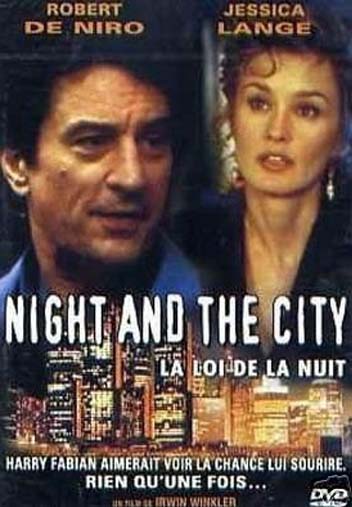http://movies.nytimes.com/movie/review?res=9E0CE7D8123DF933A25753C1A964958260
 In "Night and the City,", the glad-handing New York lawyer Harry Fabian (Robert De Niro) is seen making enemies all over town. Harry's career as an ambulance-chaser has understandably left a string of irate clients in its wake, as has his habit of borrowing money he has only the faintest intention of repaying. The film's intermittent glimpses of Harry's methods leave no doubt as to why he has a raft of problems hanging over him. On one occasion, trying to sound honest, he swears upon his goldfish's eyes.
In "Night and the City,", the glad-handing New York lawyer Harry Fabian (Robert De Niro) is seen making enemies all over town. Harry's career as an ambulance-chaser has understandably left a string of irate clients in its wake, as has his habit of borrowing money he has only the faintest intention of repaying. The film's intermittent glimpses of Harry's methods leave no doubt as to why he has a raft of problems hanging over him. On one occasion, trying to sound honest, he swears upon his goldfish's eyes.
For others this modus operandi may be irritating, but for Harry it is mostly a game. "You wanna take a walk in the park?" he cheerfully advises one guilty-looking client. "Leave the baseball bat at home." To another, a potential plaintiff who has physical injuries but says he feels all right, Harry counsels: "You wanna make some money? You feel terrible."
Harry believes in making the best of any opportunity that comes his way, whether it means phoning accident victims he finds in the newspaper or having an affair with a woman whose husband is putatively Harry's pal. But as "Night and the City" begins, Harry's gambits are sounding a little tired. The fun of running endless scams is wearing thin.
"Night and the City," with Richard Price's screenplay taken from Jules Dassin's 1950 film, which was itself based on Gerald Kersh's novel, finds Harry at a turning point. He is on the verge of trying something serious and leaving the petty hustling behind. As directed by Irwin Winkler, "Night and the City" is colorfully acted and refreshingly free of all the moody cliches such a story might be expected to thrive on. But it is also saddled with overly busy direction that sometimes interferes with the dialogue, making Mr. Price's long, perversely elegant conversational riffs hard to hear.